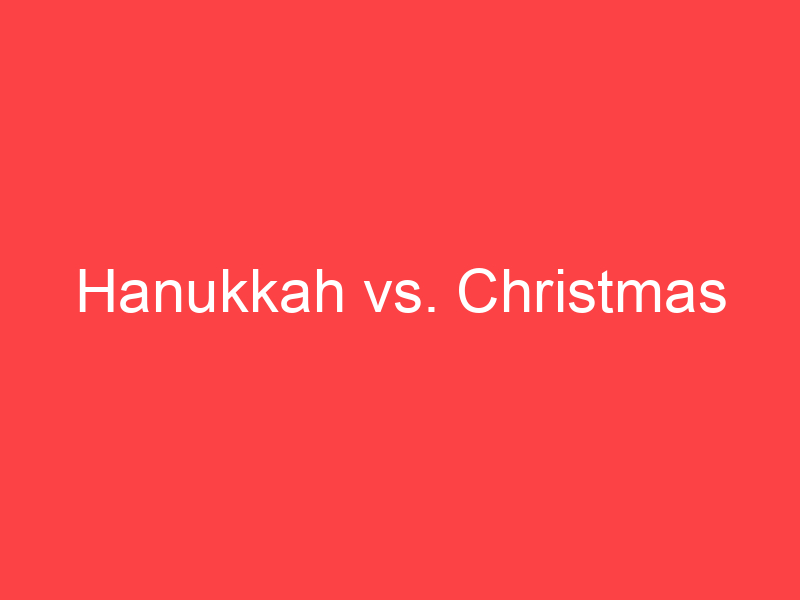Main Difference
The main difference between Hanukkah and Christmas is that the Hanukkah is a Jewish holiday and Christmas is a holiday originating in Christianity, usually celebrated on 25th December (in the Gregorian or Julian calendars)
-
Hanukkah
Hanukkah ( HAH-nə-kə; Hebrew: חֲנֻכָּה ḥanūkká, Tiberian: ḥanūkkā, usually spelled חֲנוּכָּה, pronounced [χanuˈka] in Modern Hebrew, [ˈχanukə] or [ˈχanikə] in Yiddish; a transliteration also romanized as Chanukah, Ḥanukah, Chanuka, Hanuka) is a Jewish festival commemorating the recovery of Jerusalem and subsequent rededication of the Second Temple at the beginning of the Maccabean revolt against the Seleucid Empire in the 2nd century BCE. It is also known as the Festival of Lights (Hebrew: חַג הַאוּרִים, ḥag ha’urim).
Hanukkah is observed for eight nights and days, starting on the 25th day of Kislev according to the Hebrew calendar, which may occur at any time from late November to late December in the Gregorian calendar. The festival is observed by lighting the candles of a candelabrum with nine branches, called a menorah (or hanukkiah). One branch is typically placed above or below the others and its candle is used to light the other eight candles. This unique candle is called the shamash (Hebrew: שַׁמָּשׁ, “attendant”). Each night, one additional candle is lit by the shamash until all eight candles are lit together on the final night of the festival. Other Hanukkah festivities include singing Hanukkah songs, playing the game of dreidel and eating oil-based foods, such as latkes and sufganiyot, and dairy foods. Since the 1970s, the worldwide Chabad Hasidic movement has initiated public menorah lightings in open public places in many countries.Although a relatively minor holiday in strictly religious terms, Hanukkah has attained major cultural significance in North America and elsewhere, especially among secular Jews, due to its occurring around the same time as Christmas.
-
Christmas
Christmas is an annual festival commemorating the birth of Jesus Christ, observed primarily on December 25 as a religious and cultural celebration among billions of people around the world. A feast central to the Christian liturgical year, it is preceded by the season of Advent or the Nativity Fast and initiates the season of Christmastide, which historically in the West lasts twelve days and culminates on Twelfth Night; in some traditions, Christmastide includes an octave. Christmas Day is a public holiday in many of the world’s nations, is celebrated religiously by a majority of Christians, as well as culturally by many non-Christians, and forms an integral part of the holiday season centered around it.
The traditional Christmas narrative, the Nativity of Jesus, delineated in the New Testament says that Jesus was born in Bethlehem, in accordance with messianic prophecies. When Joseph and Mary arrived in the city, the inn had no room and so they were offered a stable where the Christ Child was soon born, with angels proclaiming this news to shepherds who then further disseminated the information.Although the month and date of Jesus’ birth are unknown, by the early-to-mid fourth century the Western Christian Church had placed Christmas on December 25, a date that was later adopted in the East. Today, most Christians celebrate on December 25 in the Gregorian calendar, which has been adopted almost universally in the civil calendars used in countries throughout the world. However, some Eastern Christian Churches celebrate Christmas on December 25 of the older Julian calendar, which currently corresponds to January 7 in the Gregorian calendar, the day after the Western Christian Church celebrates the Epiphany. This is not a disagreement over the date of Christmas as such, but rather a preference of which calendar should be used to determine the day that is December 25. Moreover, for Christians, the belief that God came into the world in the form of man to atone for the sins of humanity, rather than the exact birth date, is considered to be the primary purpose in celebrating Christmas.The celebratory customs associated in various countries with Christmas have a mix of pre-Christian, Christian, and secular themes and origins. Popular modern customs of the holiday include gift giving, completing an Advent calendar or Advent wreath, Christmas music and caroling, lighting a Christingle, viewing a Nativity play, an exchange of Christmas cards, church services, a special meal, pulling Christmas crackers and the display of various Christmas decorations, including Christmas trees, Christmas lights, nativity scenes, garlands, wreaths, mistletoe, and holly. In addition, several closely related and often interchangeable figures, known as Santa Claus, Father Christmas, Saint Nicholas, and Christkind, are associated with bringing gifts to children during the Christmas season and have their own body of traditions and lore. Because gift-giving and many other aspects of the Christmas festival involve heightened economic activity, the holiday has become a significant event and a key sales period for retailers and businesses. The economic impact of Christmas has grown steadily over the past few centuries in many regions of the world.

